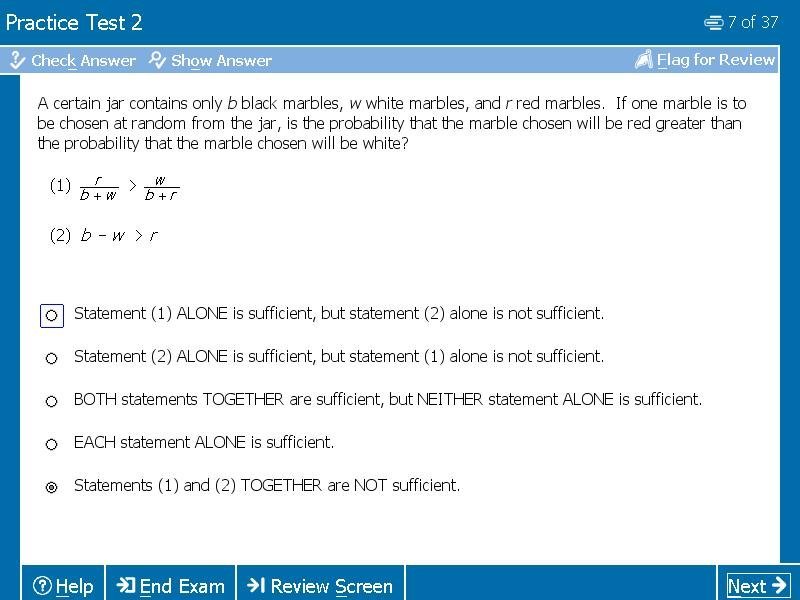Events & Promotions
|
|

GMAT Club Daily Prep
Thank you for using the timer - this advanced tool can estimate your performance and suggest more practice questions. We have subscribed you to Daily Prep Questions via email.
Customized
for You
Track
Your Progress
Practice
Pays
Not interested in getting valuable practice questions and articles delivered to your email? No problem, unsubscribe here.
- Nov 22
11:00 AM IST
-01:00 PM IST
Do RC/MSR passages scare you? e-GMAT is conducting a masterclass to help you learn – Learn effective reading strategies Tackle difficult RC & MSR with confidence Excel in timed test environment - Nov 23
11:00 AM IST
-01:00 PM IST
Attend this free GMAT Algebra Webinar and learn how to master the most challenging Inequalities and Absolute Value problems with ease. - Nov 25
10:00 AM EST
-11:00 AM EST
Prefer video-based learning? The Target Test Prep OnDemand course is a one-of-a-kind video masterclass featuring 400 hours of lecture-style teaching by Scott Woodbury-Stewart, founder of Target Test Prep and one of the most accomplished GMAT instructors.
Kudos
Bookmarks
A
Be sure to select an answer first to save it in the Error Log before revealing the correct answer (OA)!
Difficulty:
 55%
(hard)
55%
(hard)
Question Stats:
64% (02:20) correct 36%
(02:33)
wrong
36%
(02:33)
wrong  based on 2486
sessions
based on 2486
sessions
History
Date
Time
Result
Not Attempted Yet
A certain jar contains only b black marbles, w white marbles and r red marbles. If one marble is to be chosen at random from the jar, is the probability that the marble chosen will be red greater then the probability that the marble chosen will be white?
(1) \(\frac{r}{b+w} > \frac{w}{b+r}\)
(2) \(b-w > r\)

Marbles.JPG [ 64.66 KiB | Viewed 28936 times ]
(1) \(\frac{r}{b+w} > \frac{w}{b+r}\)
(2) \(b-w > r\)
Attachment:
Marbles.JPG [ 64.66 KiB | Viewed 28936 times ]
Kudos
Bookmarks
anilnandyala
The question is \(\frac{R}{R+B+W}>\frac{W}{R+B+W}\) true? Or is \(R>W\) true?
(1) \(\frac{R}{B+W} > \frac{W}{B+R}\) --> \(\frac{R}{B+W} +1> \frac{W}{B+R}+1\) --> \(\frac{R+B+W}{B+W}> \frac{W+B+R}{B+R}\) --> \(\frac{1}{B+W}> \frac{1}{B+R}\) --> \(B+R>B+W\) --> \(R>W\). Sufficient.
OR:
Given: \(\frac{R}{B+W} > \frac{W}{B+R}\) -->
Cross multiply, we can safely do this as \(B+W\) and \(B+R\) are more than zero.
We'll get \(R(B+R)>W(B+W)\) --> \(RB+R^2>WB+W^2\) --> \((R^2-W^2)+(RB-WB)>0\) --> \((R-W)(R+W)+B(R-W)>0\) --> \((R-W)(R+W+B)>0\).
As \(R+W+B>0\), the above inequality to hold true \(R-W\) must also be more than zero, so \(R-W>0\) --> \(R>W\).
(2) \(B-W>R\), not sufficient to determine whether \(R>W\) or not.
Answer: A.
Kudos
Bookmarks
I like this problem because there are at least five different ways to solve it. I'll mention a more conceptual solution since no one has mentioned it yet, but there are some great solutions above as well:
If you know the concept of "odds" that is used in daily life, you can answer this question very quickly. "Odds" are just ratios of good outcomes to bad outcomes, while probabilities are ratios of good outcomes to total outcomes (good+bad). So when we say the odds that something will happen are 2 to 1, that means there's a 2/3 probability it will happen, and a 1/3 probability it will not.
In this question, the fraction r/(b+w) is just the ratio of red marbles to other marbles, so it just represents the odds of picking a red marble. Similarly the fraction w/(b+r) is the ratio of white marbles to other marbles, so it represents the odds of picking a white marble. And if the odds of getting red are better than the odds of getting white, the probability of getting red must be higher than the probability of getting white, so S1 is sufficient.
If you know the concept of "odds" that is used in daily life, you can answer this question very quickly. "Odds" are just ratios of good outcomes to bad outcomes, while probabilities are ratios of good outcomes to total outcomes (good+bad). So when we say the odds that something will happen are 2 to 1, that means there's a 2/3 probability it will happen, and a 1/3 probability it will not.
In this question, the fraction r/(b+w) is just the ratio of red marbles to other marbles, so it just represents the odds of picking a red marble. Similarly the fraction w/(b+r) is the ratio of white marbles to other marbles, so it represents the odds of picking a white marble. And if the odds of getting red are better than the odds of getting white, the probability of getting red must be higher than the probability of getting white, so S1 is sufficient.











